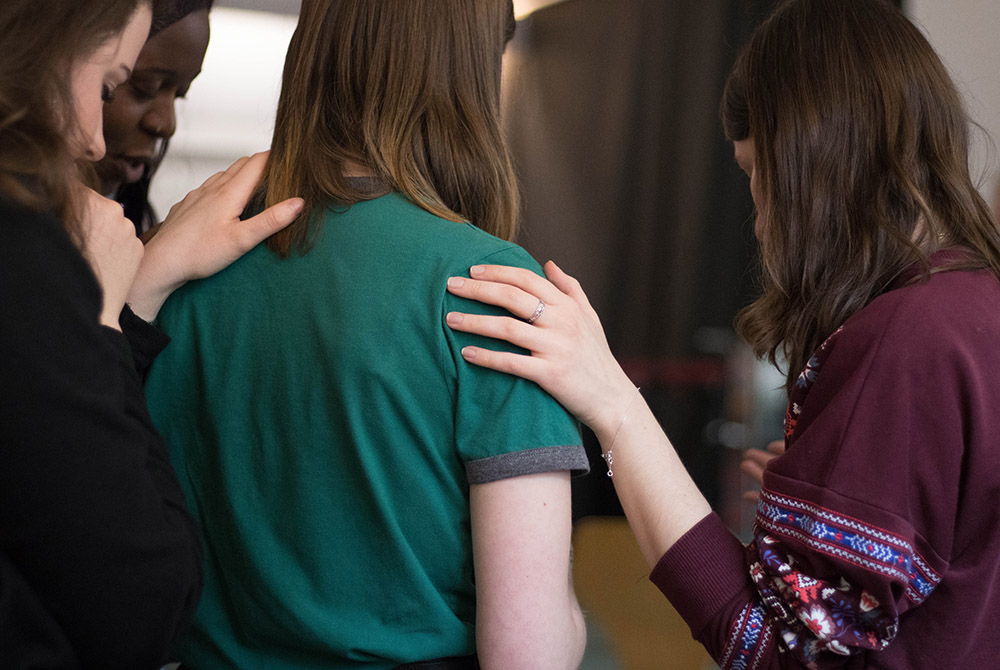
(Unsplash/Rosie Fraser)
Jean Vanier was one of my heroes, and my copy of Community and Growth is dog-eared. After years spent in life-sharing community with adults with intellectual disabilities, Vanier's books were go-to sources of inspiration on community, prayer and spirituality.
In the "models of solidarity" unit of the liberal arts seminar I taught, we spent a day on Vanier as a model, and L'Arche as a "parable of communion." I was delighted to introduce my sophomores to this servant-leader.
Vanier's words formed the core of our reflection at the first Giving Voice retreat I attended along with other idealistic, younger Catholic sisters.
Shortly before Ash Wednesday, the news broke that Vanier engaged in "manipulative sexual relationships and emotional abuse" with adult women. Vanier's mentor Thomas Philippe — like me, a Dominican — engaged in similar abusive behavior with adult women spiritual directees. Reading the report from L'Arche left me nauseated and numb.
"Another one bites the dust," texted a friend and fellow Vanier-admirer as we processed heartbreaking news.
The next day, I'm in the back pew at St Thomas the Apostle Church, weepy and longing for consolation. The Gospel words proclaimed: "Love your enemies and pray for those who persecute you."
I grit my teeth. This is not the message I want to hear. I want to cling to my feelings of anger, betrayal, indignation. I want to stand with Vanier's victims, center their stories and honor their needs. While this is a good impulse, the words of the Gospel get under my skin and push me to uncomfortable self-reflection.
Perhaps I come to love of and compassion for the enemy (while simultaneously loving victims/survivors) through the immensely difficult truth that within me lies the seed of the same deceitful, destructive impulse.
Jamie Manson recently wrote in NCR that we should "reject" the idea Vanier is like all of us as we grapple with this revelation. Indeed, Vanier's "twisting theology to force women into ritualistic sexual abuse" is extreme and horrifying. Any attempt to seek to understand his motivations is fraught with the risk of minimizing his culpability or justifying unjustifiable behavior, so I tread cautiously. Yet I dare to believe his story should cause us both to decry his sinful actions and to look deeply within ourselves about how we engage power and ensure accountability among spiritual leaders.
Recently I presided, preached, and smudged ashes onto people's faces. But first, I received ashes myself, a visible witness to my desire to turn away from sin and believe in the Gospel. In ministry, I feel more and more the need to offer a disclaimer: "I'm not up here as an expert who has got it all figured out. I'm muddling through, just like you are, in constant need of God's help."
"I am a sinner." In an interview during his first year as pope, that was Pope Francis' response to the question "Who is Jorge Mario Bergolio?" At the time, I remember thinking it sounded like old-fashioned, self-negating piety. Now, a newly professed Dominican Sister entrusted with ministries of teaching and preaching and spiritual direction, I understand and share Francis' impulse to lead with his sinfulness and limitation.
"Ministry can be exhausting. Being the 'hero' and the 'living saint,' a hundred times more so. … Ministers can escape from life into playing Church. The 'good priest' can become so obsessed with being seen as the good priest that he becomes miserable behind a mask of smiles," wrote the author of "Hero Worship Fails: Jean Vanier Falls" on Patheos.
This warning about the psychic cost of playing "hero" and "living saint" struck a chord with me and several young sister friends in recent days. Looking at disgraced spiritual heroes like Vanier — and there are far too many — the dangerous "pattern of the pedestal" emerges. When humans find some charismatic figure who seems to embody our ideals, we construct pedestals. We are quick to call them mystics and prophets. We want to outsource holiness to them.
I want to believe that Vanier — and so many others who have abused and manipulated spiritual power — possessed genuine goodness. I believe they wanted so much to own the "living saint" label, to balance atop their pedestals, to wear the hero mask, that they fell into a pernicious feedback loop where their own idealized hopes for themselves were continually reinforced by grandiose projections placed upon them.
And living saints are above the law. Living saints don't need peer supervision or ongoing mentorship or other checks on power. The brighter the light, the larger the shadow. This is a powerful cautionary tale for anyone in leadership or a public ministerial role.
My confession: Last week, a woman I greatly admire sent me an email praising my "radiating warm magnetism." My best friend describes me as "charismatic." As a sister serving in a congregation-sponsored institution I am automatically extended trust, admiration, and even deference by some of my colleagues. My headshot appears on glossy vocation promotion posters and development brochures. Journalists, intrigued by that exotic species of "millennial nun," ask for interviews. Near strangers regularly open their hearts to me upon learning I'm a sister, sharing intimate details of their lives and wanting prayer, counsel, physical touch.
All of this creates the very real risk of curating, or allowing others to curate, an idealized image of "Sister Rhonda." It constructs a pedestal which leaves me dizzy, disoriented and isolated. I'll admit it: It's a great image. Intoxicating, even. I want it to be true. I wish I could be endlessly compassionate, patient, pastoral, insightful. Gazing upon the curated image, I am tempted to "play church," playing the role of reverent yet relatable, wise yet witty … the perfect blend of holy and hipster.
But it is only Christ in me that matters — He must increase, I must decrease.
Was Vanier similarly tempted by an intoxicating, idealized image? I can't know. But I do know that as a lifelong overachiever and recovering perfectionist, I quake in boots at my capacity for self-deception and my temptation to spiritual pride and exceptionalism, even as I claim the Dominican motto of veritas, truth. This quaking leads to empathy, and even love for "enemies" who abuse power and hurt the vulnerable.
None of us graduate from needing community, accountability, guidance. None of us are finished being works in progress. None of us are ever done with taking "fearless moral inventory" and needing mercy. None of us belong on pedestals, but with our feet firmly on the ground as the people of God walking together.
Advertisement
And so we live these 40 days. The rhythm of the Divine Office daily gives us the De Profundis ("If you, oh Lord, should mark iniquities, who could stand?") and weekly offers Psalm 51 ("Create in me a clean heart"). These practices return us to our shared human frailty, fragility and imperfection.
For those of us charged with soul-care, we must steward prudently the extraordinary vulnerability entrusted to us. Especially as spiritual directors, a posture of humility and awe which drives us to prayer and ongoing formation is essential.
After hearing the call for enemy-love at Mass, I walked in the Communion procession singing "poder es servir, porque Dios es amor" (power is for service, because God is love). If indeed power is for service, we need accountability. We need to ask and answer hard questions about intimacy, boundaries, power, sexual attraction, and unconscious motivations in ministry.
And we must resist continually the impulse towards elevating spiritual heroes — whether that is a label we are tempted to give or receive. We must confess constantly that all of us are (in the words of one of my sophomores) "riding the struggle bus," and "pretty much a hot mess."
What if the dust of Lent is the dust of demolished pedestals? What pedestals of pride must be cast down in order to proclaim God alone is holy and worthy of praise?
[Sr. Rhonda Miska is in temporary profession with the Sinsinawa Dominicans and ministers at Dominican University in Chicago.]







